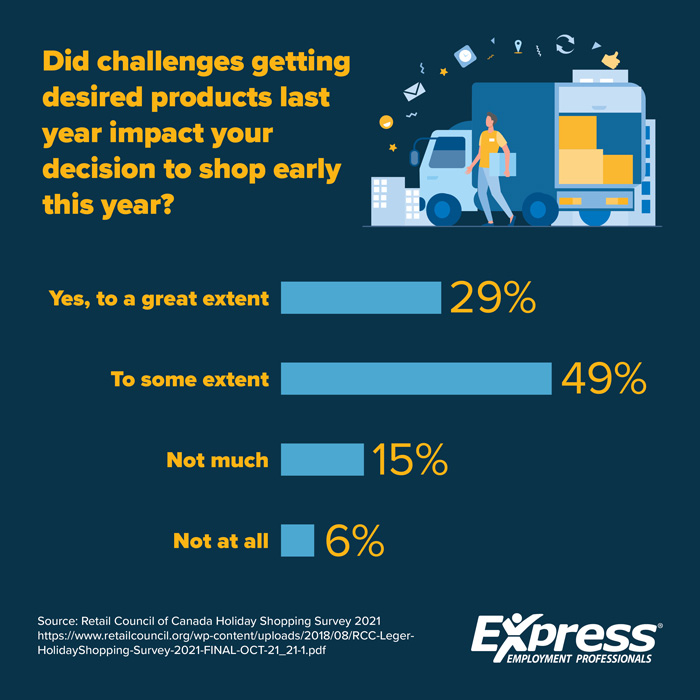Supply Chain Problems May Become the Grinch That Steals Christmas This Year
TORONTO - November 22, 2021

Supply Chain Problems May Become the Grinch That Steals Christmas This Year
Labour Shortages and Difficulty Getting Goods Hindering Canada's Economic Recovery
The weeks leading up to the holidays may not be so merry and bright for businesses as they continue to contend with increased demand, labour shortages and the latest hit-a major supply chain crunch.
Shoppers are ready to hit the stores in-person and online this year, and a recent survey from The Retail Council of Canada found that holiday spending for consumers is expected to increase at least 14% year-over-year. The survey also found that Canadians plan to shop earlier than before this year, with supply problems being the most cited reason.

While this should be good news for Canada's economic recovery after the COVID-19 government closures and lockdowns of the past 18 months, many retailers are urging shoppers to start purchasing earlier than ever to circumvent supply chain issues currently plaguing businesses.
In fact, according to a recent poll by KPMG, nearly three-in-five Canadians (58%) who have started their holiday shopping have not been able to find what they want.
Across the country, Express franchise owners say this holiday season is the perfect storm of high demand and severe labour shortages, compounded by supply chain issues that further delay the creation and delivery of goods.
According to James Norris, an Express franchise owner in London, Ontario, supply chain issues are widespread.
"We are seeing a large number of companies experiencing supply chain issues-no specific industry seems to be immune from this," Norris said. "Delays in products getting to companies is the main issue with their suppliers being unable to provide exact timelines on when products should arrive."
But delays in the supply chain overseas aren't the only major problem; labour shortages in supply chain jobs in Canada have also become severe.
"We are seeing shortages in truck drivers, warehouse workers such as shipper/receivers or pick and packers and forklift operators," Norris said. "Even with sign-on bonuses being offered and wages increasing, shortages in these job categories persist."
In Edmonton, Alberta, franchise owner Jessica Culo is seeing the same issues.
"Even with rising wages, anything customer-facing, anything that requires rotating or adjusted schedules, anything that requires intense physical labour and anything that requires driving are all jobs that employers are having a very difficult time filling," Culo said.
In her area, supply chain issues are most acutely impacting companies that sell furniture, automotive-related parts and goods, construction materials, cleaning supplies and home appliances.
Both Norris and Culo say supply chain issues are not short-term problems.
"I do not see an end in sight," said Norris. "The upcoming year looks to have many of the same issues we are currently facing with many companies unable to completely solve their staffing shortages and remaining behind in filling customer orders or production."
Culo's advice to employers is to be proactive about offering employees and job seekers high pay and benefits "to ensure their valued employees are looked after, instead of doing it because employees are already leaving, taking other offers, and prospective employees are declining offers."
Interestingly, one major outcome of supply chain issues could be that Canadian companies begin to source and purchase goods closer to home.
"The issues caused at many seaports will not be stopping anytime soon, and could get worse before they get better," Norris said. "The only way for companies to try and avoid this is to source materials and products from local companies that will not have these challenges in getting the products and materials to them."
Bringing those on the sidelines back into the workforce is critical to easing the backlog of materials and goods," Express CEO Bill Stoller said.
"We saw healthy organic economic growth in the third quarter, and Canadians are eager to spend their extra funds on loved ones over the next few months," Stoller said. "While the demand for goods is exciting after the downturn of 2020, we need more workers to realize the full fiscal potential of the fourth quarter of 2021."
###
If you would like to arrange for an interview to discuss this topic, please contact Ana Curic at (613) 858-2622 or email
ana@mapleleafstrategies.com.
About Bill Stoller
William H. "Bill" Stoller is chairman and chief executive officer of Express Employment Professionals. Headquartered in Oklahoma City, Oklahoma, the international staffing company has more than 830 franchises in the U.S., Canada, South Africa, Australia and New Zealand. Since inception, Express has put more than 9 million people to work worldwide.
About Express Employment Professionals
At Express Employment Professionals, we're in the business of people. From job seekers to client companies, Express helps people thrive and businesses grow. Our international network of franchises offers localized staffing solutions to the communities they serve across the U.S., Canada, South Africa, Australia and New Zealand, employing 526,000 people globally in 2020. For more information, visit
www.ExpressPros.com.